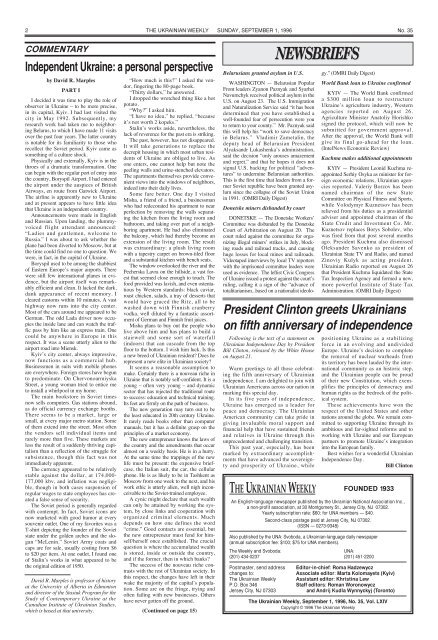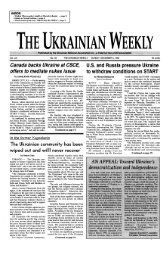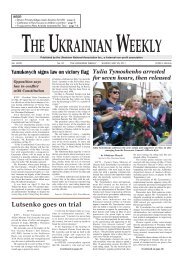Published by the Ukrainian National Association Inc
Published by the Ukrainian National Association Inc
Published by the Ukrainian National Association Inc
Create successful ePaper yourself
Turn your PDF publications into a flip-book with our unique Google optimized e-Paper software.
2 THE UKRAINIAN WEEKLY SUNDAY, SEPTEMBER 1, 1996<br />
No. 35<br />
COMMENTARY<br />
Independent Ukraine: a personal perspective<br />
<strong>by</strong> David R. Marples<br />
PART I<br />
I decided it was time to play <strong>the</strong> role of<br />
observer in Ukraine – to be more precise,<br />
in its capital, Kyiv. I had last visited <strong>the</strong><br />
city in May 1992. Subsequently, my<br />
research work had taken me to neighboring<br />
Belarus, to which I have made 11 visits<br />
over <strong>the</strong> past four years. The latter country<br />
is notable for its familiarity to those who<br />
recollect <strong>the</strong> Soviet period. Kyiv came as<br />
something of a culture shock.<br />
Physically and externally, Kyiv is in <strong>the</strong><br />
throes of a dramatic transformation. One<br />
can begin with <strong>the</strong> regular port of entry into<br />
<strong>the</strong> country, Boryspil Airport. I had entered<br />
<strong>the</strong> airport under <strong>the</strong> auspices of British<br />
Airways, en route from Gatwick Airport.<br />
The airline is apparently new to Ukraine<br />
and at present appears to have little idea<br />
that Ukraine is an independent country.<br />
Announcements were made in English<br />
and Russian. Upon landing, <strong>the</strong> plummyvoiced<br />
flight attendant announced:<br />
“Ladies and gentlemen, welcome to<br />
Russia.” I was about to ask whe<strong>the</strong>r <strong>the</strong><br />
plane had been diverted to Moscow, but at<br />
<strong>the</strong> time could find no one to question. We<br />
were, in fact, in <strong>the</strong> capital of Ukraine.<br />
Boryspil used to be among <strong>the</strong> shabbiest<br />
of Eastern Europe’s major airports. There<br />
were still few international planes in evidence,<br />
but <strong>the</strong> airport itself was remarkably<br />
efficient and clean. It lacked <strong>the</strong> dark,<br />
dank appearance of recent memory. I<br />
cleared customs within 10 minutes. A vast<br />
highway now runs into <strong>the</strong> city center.<br />
Most of <strong>the</strong> cars around me appeared to be<br />
German. The odd Lada driver now occupies<br />
<strong>the</strong> inside lane and can watch <strong>the</strong> traffic<br />
pass <strong>by</strong> him like an express train. One<br />
could be anywhere in Europe in this<br />
respect. It was a scene utterly alien to <strong>the</strong><br />
airport road into Miensk.<br />
Kyiv’s city center, always impressive,<br />
now functions as a commercial hub.<br />
Businessmen in suits with mobile phones<br />
are everywhere. Foreign stores have begun<br />
to predominate. On Chervonoarmiyska<br />
Street, a young woman tried to entice me<br />
to install a whirlpool in my home.<br />
The main bookstore in Soviet times<br />
now sells computers. Gas stations abound,<br />
as do official currency exchange booths.<br />
There seems to be a market, large or<br />
small, at every major metro station. Some<br />
of <strong>the</strong>m extend into <strong>the</strong> street. Most often<br />
<strong>the</strong> vendors sell individual items and<br />
rarely more than five. These markets are<br />
less <strong>the</strong> result of a suddenly thriving capitalism<br />
than a reflection of <strong>the</strong> struggle for<br />
subsistence, though this fact was not<br />
immediately apparent.<br />
The currency appeared to be relatively<br />
stable against <strong>the</strong> dollar, at 174,000-<br />
177,000 kbv, and inflation was negligible,<br />
though in both cases suspension of<br />
regular wages to state employees has created<br />
a false sense of security.<br />
The Soviet period is generally regarded<br />
with contempt. In fact, Soviet icons are<br />
now marketed with good humor at every<br />
souvenir outlet. One of my favorites was a<br />
T-shirt depicting <strong>the</strong> founder of <strong>the</strong> Soviet<br />
state under <strong>the</strong> golden arches and <strong>the</strong> slogan<br />
“McLenin.” Soviet Army coats and<br />
caps are for sale, usually costing from $6<br />
to $20 per item. At one outlet, I found one<br />
of Stalin’s works in what appeared to be<br />
<strong>the</strong> original edition of 1950.<br />
David R. Marples is professor of history<br />
at <strong>the</strong> University of Alberta in Edmonton<br />
and director of <strong>the</strong> Stasiuk Program for <strong>the</strong><br />
Study of Contemporary Ukraine at <strong>the</strong><br />
Canadian Institute of <strong>Ukrainian</strong> Studies,<br />
which is based at that university.<br />
“How much is this?” I asked <strong>the</strong> vendor,<br />
fingering <strong>the</strong> 80-page book.<br />
“Thirty dollars,” he answered.<br />
I dropped <strong>the</strong> wretched thing like a hot<br />
potato.<br />
“Why?” I asked him.<br />
“I have no idea,” he replied, “because<br />
it’s not worth 2 kopeks.”<br />
Stalin’s works aside, never<strong>the</strong>less, <strong>the</strong><br />
lack of reverence for <strong>the</strong> past era is striking.<br />
The past, however, has not disappeared.<br />
It will take generations to replace <strong>the</strong><br />
decrepit housing in which most urban residents<br />
of Ukraine are obliged to live. As<br />
one enters, one cannot help but note <strong>the</strong><br />
peeling walls and urine-stenched elevators.<br />
The apartments <strong>the</strong>mselves provide convenient<br />
views into <strong>the</strong> windows of neighbors,<br />
indeed into <strong>the</strong>ir daily lives.<br />
Some fare better. One day I visited<br />
Misha, a friend of a friend, a businessman<br />
who had redecorated his apartment to near<br />
perfection <strong>by</strong> removing <strong>the</strong> walls separating<br />
<strong>the</strong> kitchen from <strong>the</strong> living room and<br />
bathroom, and taking over part of a neighboring<br />
apartment. He had also eliminated<br />
<strong>the</strong> balcony, which had <strong>the</strong>re<strong>by</strong> become an<br />
extension of <strong>the</strong> living room. The result<br />
was extraordinary: a plush living room<br />
with a tapestry carpet on brown-tiled floor<br />
and a substantial kitchen with bench seats.<br />
The window overlooked <strong>the</strong> river and <strong>the</strong><br />
Pecherska Lavra on <strong>the</strong> hillside, a vast forest<br />
that seemed close enough to touch. The<br />
food provided was lavish, and even ostentatious<br />
<strong>by</strong> Western standards: black caviar,<br />
roast chicken, salads, a tray of desserts that<br />
would have graced <strong>the</strong> Ritz, all to be<br />
washed down with Finnish cranberry<br />
vodka, well diluted <strong>by</strong> a fantastic assortment<br />
of German and Finnish fruit juices.<br />
Misha plans to buy out <strong>the</strong> people who<br />
live above him and has plans to build a<br />
stairwell and some sort of waterfall<br />
(indoors) that can cascade from <strong>the</strong> top<br />
floor to <strong>the</strong> bottom. I wish him luck. Is this<br />
a new breed of <strong>Ukrainian</strong> resident? Does he<br />
represent a new elite in <strong>Ukrainian</strong> society?<br />
It seems a reasonable assumption to<br />
make. Certainly <strong>the</strong>re is a nouveau riche in<br />
Ukraine that is notably self-confident. It is a<br />
young – often very young – and dynamic<br />
sector that has rejected <strong>the</strong> traditional route<br />
to success: education and technical training.<br />
Its feet are firmly on <strong>the</strong> path of business.<br />
The new generation may turn out to be<br />
<strong>the</strong> least educated in 20th century Ukraine.<br />
It rarely reads books o<strong>the</strong>r than computer<br />
manuals, but it has a definite grasp on <strong>the</strong><br />
principles of a market economy.<br />
The new entrepreneur knows <strong>the</strong> laws of<br />
<strong>the</strong> country and <strong>the</strong> amendments that occur<br />
almost on a weekly basis. He is in a hurry.<br />
At <strong>the</strong> same time <strong>the</strong> trappings of <strong>the</strong> new<br />
life must be present: <strong>the</strong> expensive briefcase,<br />
<strong>the</strong> Italian suit, <strong>the</strong> car, <strong>the</strong> cellular<br />
phone. He is as likely to be in Tashkent as<br />
Moscow from one week to <strong>the</strong> next, and his<br />
work ethic is utterly alien, well nigh inconceivable<br />
to <strong>the</strong> Soviet-trained employee.<br />
A cynic might declare that such wealth<br />
can only be attained <strong>by</strong> working <strong>the</strong> system,<br />
<strong>by</strong> close links and cooperation with<br />
organized criminal elements. Much<br />
depends on how one defines <strong>the</strong> word<br />
“crime.” Good contacts are essential, but<br />
<strong>the</strong> new entrepreneur must fend for himself/herself<br />
once established. The crucial<br />
question is where <strong>the</strong> accumulated wealth<br />
is stored, inside or outside <strong>the</strong> country,<br />
and if <strong>the</strong> former, <strong>the</strong>n in which banks?<br />
The success of <strong>the</strong> nouveau riche contrasts<br />
with <strong>the</strong> rest of <strong>Ukrainian</strong> society. In<br />
this respect, <strong>the</strong> changes have left in <strong>the</strong>ir<br />
wake <strong>the</strong> majority of <strong>the</strong> capital’s population.<br />
Some are on <strong>the</strong> fringe, trying and<br />
often failing with new businesses. O<strong>the</strong>rs<br />
have never gotten off <strong>the</strong> ground.<br />
(Continued on page 15)<br />
Belarusians granted asylum in U.S.<br />
NEWSBRIEFS<br />
WASHINGTON — Belarusian Popular<br />
Front leaders Zyanon Paznyak and Syarhei<br />
Navumchyk received political asylum in <strong>the</strong><br />
U.S. on August 23. The U.S. Immigration<br />
and Naturalization Service said “it has been<br />
determined that you have established a<br />
well-founded fear of persecution were you<br />
to return to your county.” Mr. Paznyak said<br />
this will help his “work to save democracy<br />
in Belarus.” Vladimir Zametalin, <strong>the</strong><br />
deputy head of Belarusian President<br />
Alyaksandr Lukashenka’s administration,<br />
said <strong>the</strong> decision “only arouses amazement<br />
and regret,” and that he hopes it does not<br />
signal U.S. backing for political “adventures”<br />
to undermine Belarusian authorities.<br />
This is <strong>the</strong> first time that leaders from a former<br />
Soviet republic have been granted asylum<br />
since <strong>the</strong> collapse of <strong>the</strong> Soviet Union<br />
in 1991. (OMRI Daily Digest)<br />
Donetske miners disbanded <strong>by</strong> court<br />
DONETSKE — The Donetske Workers’<br />
Committee was disbanded <strong>by</strong> <strong>the</strong> Donetske<br />
Court of Arbitration on August 20. The<br />
court ruled against <strong>the</strong> committee for organizing<br />
illegal miners’ strikes in July, blocking<br />
roads and railroad tracks, and causing<br />
huge losses for local mines and railroads.<br />
Videotaped interviews <strong>by</strong> local TV reporters<br />
with <strong>the</strong> imprisoned committee leaders were<br />
used as evidence. The leftist Civic Congress<br />
of Ukraine issued a protest against <strong>the</strong> court’s<br />
ruling, calling it a sign of <strong>the</strong> “advance of<br />
totalitarianism...based on a nationalist ideology.”<br />
(OMRI Daily Digest)<br />
World Bank loan to Ukraine confirmed<br />
KYIV — The World Bank confirmed<br />
a $300 million loan to restructure<br />
Ukraine’s agriculture industry, Western<br />
agencies reported on August 26.<br />
Agriculture Minister Anatoliy Horishko<br />
signed <strong>the</strong> protocol, which will now be<br />
submitted for government approval.<br />
After <strong>the</strong> approval, <strong>the</strong> World Bank will<br />
give its final go-ahead for <strong>the</strong> loan.<br />
(IntelNews Economic Review)<br />
Kuchma makes additional appointments<br />
KYIV — President Leonid Kuchma reappointed<br />
Serhiy Osyka as minister for foreign<br />
economic relations, <strong>Ukrainian</strong> agencies<br />
reported. Valeriy Borzov has been<br />
named chairman of <strong>the</strong> new State<br />
Committee on Physical Fitness and Sports,<br />
while Volodymyr Kuznetsov has been<br />
relieved from his duties as a presidential<br />
adviser and appointed chairman of <strong>the</strong><br />
State Credit and Investment Co. Mr.<br />
Kuznetsov replaces Borys Sobolev, who<br />
was fired from that post several months<br />
ago. President Kuchma also dismissed<br />
Oleksander Savenko as president of<br />
<strong>Ukrainian</strong> State TV and Radio, and named<br />
Zinoviy Kulyk as acting president.<br />
<strong>Ukrainian</strong> Radio reported on August 26<br />
that President Kuchma liquidated <strong>the</strong> State<br />
Tax Inspection Agency and formed a new,<br />
more powerful Institute of State Tax<br />
Administration. (OMRI Daily Digest)<br />
President Clinton greets <strong>Ukrainian</strong>s<br />
on fifth anniversary of independence<br />
Following is <strong>the</strong> text of a statement on<br />
<strong>Ukrainian</strong> Independence Day <strong>by</strong> President<br />
Bill Clinton, released <strong>by</strong> <strong>the</strong> White House<br />
on August 21.<br />
Warm greetings to all those celebrating<br />
<strong>the</strong> fifth anniversary of <strong>Ukrainian</strong><br />
independence. I am delighted to join with<br />
<strong>Ukrainian</strong> Americans across our nation in<br />
marking this special day.<br />
In its five years of independence,<br />
Ukraine has emerged as a leader for<br />
peace and democracy. The <strong>Ukrainian</strong><br />
American community can take pride in<br />
giving invaluable moral support and<br />
financial help that have sustained friends<br />
and relatives in Ukraine through this<br />
unprecedented and challenging transition.<br />
This past year, especially, has been<br />
marked <strong>by</strong> extraordinary accomplishments<br />
that have advanced <strong>the</strong> sovereignty<br />
and prosperity of Ukraine, while<br />
THE UKRAINIAN WEEKLY FOUNDED 1933<br />
An English-language newspaper published <strong>by</strong> <strong>the</strong> <strong>Ukrainian</strong> <strong>National</strong> <strong>Association</strong> <strong>Inc</strong>.,<br />
a non-profit association, at 30 Montgomery St., Jersey City, NJ 07302.<br />
Yearly subscription rate: $60; for UNA members — $40.<br />
Second-class postage paid at Jersey City, NJ 07302.<br />
(ISSN — 0273-9348)<br />
Also published <strong>by</strong> <strong>the</strong> UNA: Svoboda, a <strong>Ukrainian</strong>-language daily newspaper<br />
(annual subscription fee: $100; $75 for UNA members).<br />
The Weekly and Svoboda:<br />
UNA:<br />
(201) 434-0237 (201) 451-2200<br />
Postmaster, send address<br />
changes to:<br />
The <strong>Ukrainian</strong> Weekly<br />
P.O. Box 346<br />
Jersey City, NJ 07303<br />
positioning Ukraine as a stabilizing<br />
force in an evolving and undivided<br />
Europe. Ukraine’s decision to complete<br />
<strong>the</strong> removal of nuclear warheads from<br />
its territory has been lauded <strong>by</strong> <strong>the</strong> international<br />
community as an historic step,<br />
and <strong>the</strong> <strong>Ukrainian</strong> people can be proud<br />
of <strong>the</strong>ir new Constitution, which exemplifies<br />
<strong>the</strong> principles of democracy and<br />
human rights as <strong>the</strong> bedrock of <strong>the</strong> political<br />
system.<br />
These achievements have won <strong>the</strong><br />
respect of <strong>the</strong> United States and o<strong>the</strong>r<br />
nations around <strong>the</strong> globe. We remain committed<br />
to supporting Ukraine through its<br />
ambitious and far-sighted reforms and to<br />
working with Ukraine and our European<br />
partners to promote Ukraine’s integration<br />
into <strong>the</strong> European family.<br />
Best wishes for a wonderful <strong>Ukrainian</strong><br />
Independence Day.<br />
Bill Clinton<br />
Editor-in-chief: Roma Hadzewycz<br />
Associate editor: Marta Kolomayets (Kyiv)<br />
Assistant editor: Khristina Lew<br />
Staff editors: Roman Woronowycz<br />
and Andrij Kudla Wynnyckyj (Toronto)<br />
The <strong>Ukrainian</strong> Weekly, September 1, 1996, No. 35, Vol. LXIV<br />
Copyright © 1996 The <strong>Ukrainian</strong> Weekly

















